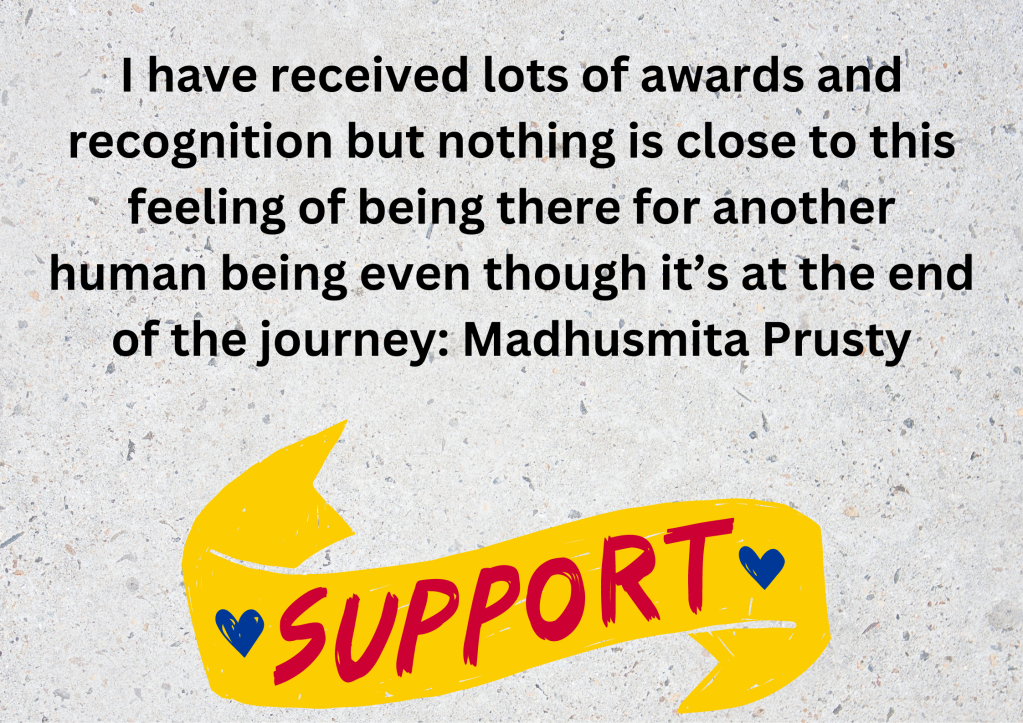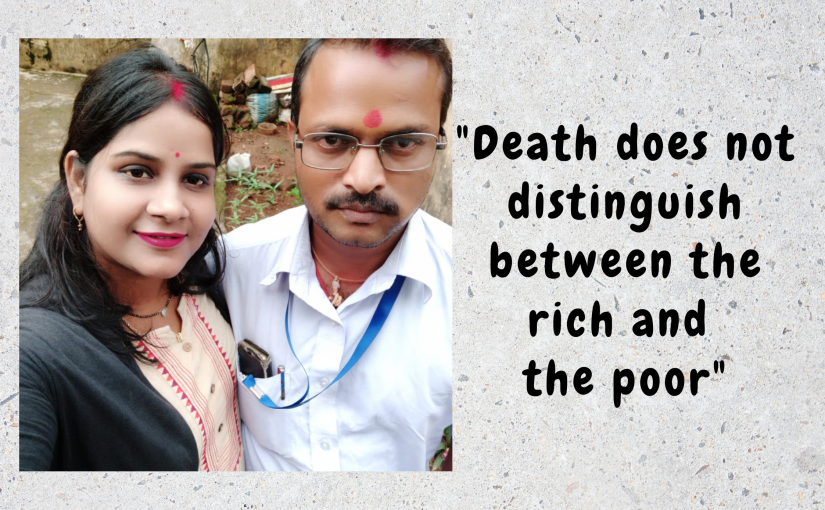Bhubaneshwar-based Pradeep and Madhusmita Prusty are an extraordinary couple. On most days, their day begins and ends at the local cremation ground. To perform the last rites of unclaimed bodies is the mission of their lives. Be it the recent triple train tragedy at Balasore in Odisha, the Covid-19 pandemic or even during perfectly normal times, the Prustys have been doing their bit for society. Selflessly. This is their story.
….
Deepika Sahu
On a typical day, Bhubaneshwar-based Pradeep and Madhusmita Prusty get a couple of phone calls from local police stations. It is their call for duty. After making all the necessary arrangements for funerals, they rush to the local crematorium to perform the last rites of unclaimed bodies. To give a dignified farewell to people who don’t have families to do the needful is the mission of their lives. Their story is about courage and grit.
Be it the recent triple train tragedy at Balasore in Odisha on June 2, which, as per the official figures, claimed the lives of 291 people, the many waves of the Covid-19 pandemic and even during perfectly normal times, the Prustys have been doing their bit for society. Selflessly.
Prusty, 48, was always interested in social work. “My younger sister and I studied in the old city of Bhubaneswar. Our school was near a hospital and we used to go to a shop near the hospital to buy chocolates. We used to interact with the relatives of the patients.” That probably was the beginning of the journey.
The turning point came in the year 1980 when Prusty was just five. His mother died by suicide on a railway track and the family had no information about her for four-five days. That was one of the most traumatic experiences of his life. “It was then that I decided to give a dignified farewell to people in the event of death,” says Prusty, who has earned his living in his adult years by doing many odd jobs like working as a construction worker and selling vegetables.
The circumstances of the death of his mother and the trauma associated with it never really left him. That also made him realise the importance of the task he has undertaken. In 2014, he started the Pradeep Seva Trust along with 11 of his friends as trustees. He was 39 years old at that time and since then there has been no looking back for him as service has become the core of his life.
Between 2014 and 2016, Prusty drove an auto. He used the same auto to take unclaimed bodies to the crematorium. In 2017, he decided to get a van as it was becoming too difficult to carry the bodies in an auto. Finally, in 2020, the trust members contributed some money and he got a bank loan to buy an ambulance. “I have to pay the EMI for one more year,” he says.

Sharing his experience of working during the recent train tragedy (June 2, 2023) in Odisha, Prusty says: “We went to the tragedy site the next morning. It was a tough experience because of the massive scale of the tragedy. It was very hard on our team members too. After that, we did volunteer work at Cuttack. We also helped in the post-mortem cases at hospitals as the pressure was too much.”
The volunteers at the Trust swing into action the moment they get a phone call from the police station. “We chip in whenever someone calls up for help. In our society, there is so much wealth disparity. For people from less privileged backgrounds, it is always a struggle to arrange a funeral. In that case, we come forward to help with wood and other support,” he says.
Prusty feels that his work would not have been possible without the active participation of his wife, Madhusmita, 38.“Once while picking up a dead body from the railway track, my leg got fractured. I could not work and it was a tough time for me. Seeing my situation, my wife came forward to help me. It was incredible that a woman came forward to do this. I can’t thank her enough for her courage and sense of service,” he says.
She was working in Chennai as a nurse and was paid well. But in 2019, she quit her job to join the Pradeep Seva Trust. How difficult was it? Was she scared? “Birth and death are the only truths of life. How can I be scared of the truth? Initially, it was tough but it has been a life-altering experience; especially during the Covid-19 pandemic, when family members shunned their loved ones, I came forward to do their last rites. There were many who did not even want to come anywhere near their departed family members,” she shares.
To give the dead a warm farewell in the midst of a raging pandemic was a soul-elevating experience for her. “I have received lots of awards and recognition but nothing is close to this feeling of being there for another human being even though it’s at the end of the journey,” she says.

It’s not easy for a woman to be engaged in this work. How has been the reaction of people around her? She laughs and says: “There are some people who still come to my house for some work or the other but they won’t have water in my house. Recently, an educated person came to my house and asked me, ‘Are there ghosts in your house?’ And then there are people who ask me what’s the need for me to do this work when I come from a decent background?”
The couple has sacrificed everything for this work.
“There are times when I have to leave family gatherings and functions because there is a need to rush to work. However, I have absolutely no regrets. Right now, we have an all- women’s team comprising five members. They are doing incredible work and it is deeply satisfying and liberating to see them work,” says Madhusmita, a mother of two—a son and a daughter.
Sharing her greatest learning, she says: “Death does not distinguish between the rich and the poor. I believe in the dignity of life and more importantly, I believe everyone deserves a farewell at the end of the journey.”

Technology has been of great help in their work. They are happy and proud that even though they have not received any assistance from the government, the trust members and their friends and acquaintances have always come forward to support them monetarily whenever they are in dire need. They just share a message on WhatApp and people come forward to help according to their ability. But, at the same time, because of limited monetary resources, they face a lot of constraints. They need more stretchers and gloves so that the work process becomes smoother.
How do they see the future? “We will keep on giving our services whenever there’s a need. When a person has nobody, we come forward to stand with that person … even if we are talking about death here. We become the family member of that dead person in the absence of the family. We have only love and a sense of service in our heart,” says Pradeep.
Deepika Sahu has been a journalist for 28 years. She has worked with some of India’s leading media houses like the Press Trust of India, Deccan Herald and The Times of India. Right now, she is independently engaged in content creation and curation.
Twitter: @menondeepika, Instagram: @moodydeepika Facebook: Deepika Sahu
